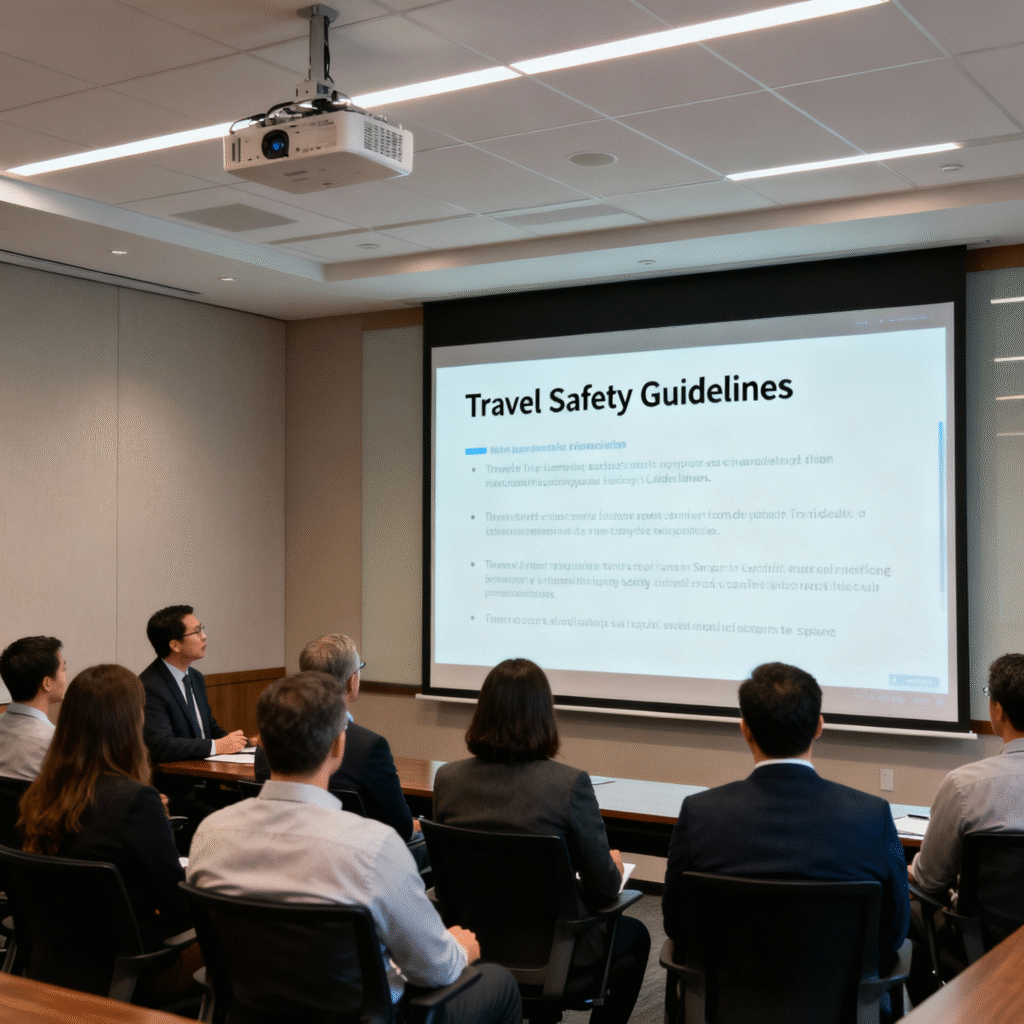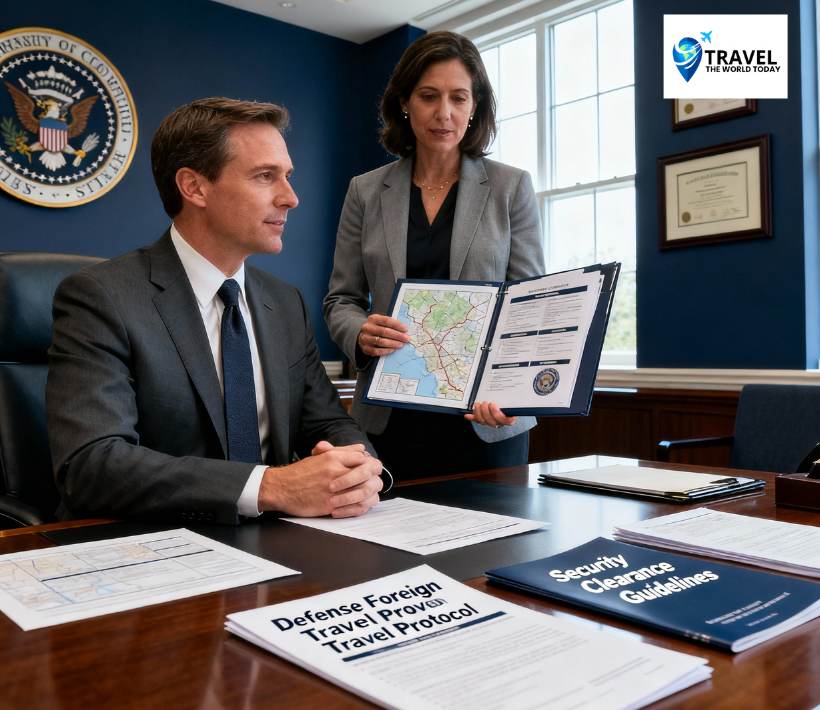Do You Know How Often Must You Receive a Defensive Foreign Travel Briefing for Safe Travel?
Are you planning to travel abroad for work? If you hold a security clearance or work with sensitive information, you need to know how often must you receive a defensive foreign travel briefing. This requirement isn’t just bureaucratic red tape—it’s your shield against foreign intelligence threats.
Defensive foreign travel briefings protect you from espionage, cyberattacks, and security risks while traveling internationally. Whether you’re a federal employee, military member, or contractor, understanding the frequency and importance of these briefings keeps you safe and compliant. Missing your briefing can result in serious consequences, from compromised missions to revoked clearances.
This guide answers every question about how often must you receive a defensive foreign travel briefing, what they cover, and why they’re non-negotiable for secure international travel.
What Is a Defensive Foreign Travel Briefing?
Understanding the Basics
A defensive foreign travel briefing is a mandatory security training session for anyone with access to classified information who plans to travel outside the United States. These briefings prepare you for potential threats from foreign intelligence services, criminal organizations, and hostile actors.
The briefing covers counterintelligence awareness, physical security protocols, and cybersecurity measures. You’ll learn how to recognize surveillance, protect sensitive information, and respond to security incidents abroad. Think of it as your survival guide for navigating the complex security landscape of international travel.
The Defense Counterintelligence and Security Agency (DCSA) and individual agency security offices typically conduct these briefings. The content is tailored to your clearance level, destination, and mission requirements.

Who Requires These Briefings?
Not everyone traveling abroad needs a defensive foreign travel briefing. These requirements apply specifically to:
- Federal government employees with security clearances
- Military personnel on official or personal travel
- Government contractors handling classified information
- Anyone accessing Sensitive Compartmented Information (SCI)
- Personnel traveling to high-risk or adversarial nations
Even if you’re traveling on vacation, you still need the briefing if you hold a clearance. Foreign intelligence services don’t distinguish between business and leisure travel—they see every cleared person as a potential target.
How Often Must You Receive a Defensive Foreign Travel Briefing?
Standard Frequency Requirements
The answer to how often must you receive a defensive foreign travel briefing depends on your organization and travel patterns. Here’s the standard breakdown:
Before every international trip: Most agencies require a briefing before each foreign travel event, regardless of how recently you received your last briefing.
Annually: Some organizations mandate annual briefings for personnel who travel frequently. This ensures you stay current on evolving threats and updated security protocols.
After extended periods without travel: If you haven’t traveled internationally in over 12 months, you’ll need a refresher briefing before your next trip.
The Department of Defense (DoD) typically requires briefings before each trip to foreign countries. The Intelligence Community often has more stringent requirements, especially for travel to high-risk nations like Russia, China, Iran, or North Korea.
Situation-Based Requirements
Beyond standard frequencies, certain situations trigger mandatory briefings:
Change in clearance level: When you receive a higher clearance, you need an updated briefing that addresses the increased security responsibilities.
Travel to newly designated high-risk areas: If a country’s threat level changes, you’ll need a special briefing even if you recently completed your annual training.
Involvement in sensitive programs: Special Access Programs (SAPs) often require program-specific briefings in addition to standard defensive foreign travel briefings.
Security incidents or close calls: If you or someone in your organization experiences a security incident abroad, additional briefings may be required to prevent future occurrences.

Why Defensive Foreign Travel Briefings Matter
Security Threats You Need to Know
Foreign intelligence services actively target Americans with security clearances. Understanding how often must you receive a defensive foreign travel briefing is crucial because threats evolve constantly.
Espionage attempts are the primary concern. Countries like China, Russia, and Iran maintain sophisticated intelligence operations designed to recruit U.S. personnel or steal classified information. These services use everything from honey traps to blackmail to compromise cleared individuals.
Cyber threats have exploded in recent years. Public Wi-Fi networks in foreign countries are often monitored or compromised. Hackers can steal data from your devices, install malware, or track your activities through seemingly innocent apps.
Physical surveillance is more common than you think. Foreign intelligence operatives may follow you, search your hotel room, or attempt “bump” operations to establish contact. Your briefing teaches you to recognize these tactics and respond appropriately.
Real-World Scenarios
Consider these actual incidents that highlight why defensive foreign travel briefings are essential:
A defense contractor traveling to China had her laptop compromised at a hotel. Sophisticated malware was installed while she slept, stealing proprietary information worth millions. She hadn’t taken basic precautions covered in her briefing.
A State Department employee was approached by an attractive stranger at a bar in Moscow. The encounter was orchestrated by Russian intelligence to gather information about upcoming diplomatic initiatives. His briefing had warned about such recruitment tactics.
A military officer’s phone was cloned at a foreign airport charging station. Adversaries gained access to his contacts, messages, and location data. Simple measures from his briefing could have prevented this breach.
What Topics Are Covered in Defensive Foreign Travel Briefings?
Counterintelligence Awareness
Your defensive foreign travel briefing extensively covers counterintelligence threats. You’ll learn the MICE motivations that foreign services use to recruit Americans: Money, Ideology, Compromise, and Ego.
The briefing explains common recruitment tactics. Foreign intelligence services often approach targets through seemingly innocent encounters at conferences, hotels, or tourist attractions. They build rapport over time, exploiting vulnerabilities before making direct requests for information.
You’ll receive training on recognizing surveillance. This includes identifying fixed surveillance posts, vehicle follows, and foot surveillance teams. Understanding these techniques helps you detect when you’re being monitored and report it to security personnel.
Physical Security Measures
Physical security is a major component of understanding how often must you receive a defensive foreign travel briefing. Each briefing reinforces critical protective measures:
Hotel security protocols include inspecting your room for listening devices, using door alarms, and keeping the “Do Not Disturb” sign displayed. Never discuss classified information in hotel rooms, even if they seem secure.
Document protection requires that you never travel with classified materials unless absolutely necessary and properly authorized. Keep all work-related documents secured or on your person at all times.
Personal security covers avoiding dangerous areas, varying your routines, and maintaining situational awareness. Your briefing provides country-specific guidance based on local threat levels and cultural considerations.

Cybersecurity Protocols
Cybersecurity receives increasing emphasis in defensive foreign travel briefings as digital threats multiply:
Device security starts before you leave. Use clean, sanitized devices for foreign travel—never bring your regular work phone or laptop. Assume any device taken abroad will be compromised and treat it accordingly.
Network security means avoiding public Wi-Fi entirely or using only approved VPN connections. Disable Bluetooth, turn off auto-connect features, and refuse hotel room network connections.
Social media discipline is critical. Foreign intelligence services monitor social media to track your movements, identify associates, and gather personal information. Your briefing covers social media best practices and what never to post while traveling.
Who Must Attend Defensive Foreign Travel Briefings?
Government Employees and Contractors
Federal civilian employees with Secret or Top Secret clearances must receive defensive foreign travel briefings. This applies to employees from every agency, from the State Department to the Department of Agriculture.
Defense contractors working on classified programs face the same requirements. Your company’s security office coordinates with government sponsors to ensure compliance. Contractor briefings often include additional proprietary information protection requirements.
Subcontractors and consultants with clearances also need briefings, even for short trips. Don’t assume that brief international visits fall outside these requirements—they don’t.

Military Personnel
All military members with clearances need defensive foreign travel briefings for official and personal international travel. The frequency requirement is typically before each trip, regardless of destination.
Special Operations Forces receive enhanced briefings that address unique operational security concerns. These briefings include advanced surveillance detection and counter-surveillance techniques.
Military family members traveling with cleared personnel may also receive abbreviated briefings. While they don’t hold clearances themselves, they can inadvertently compromise security through innocent actions.
Private Sector Requirements
Some private companies require defensive foreign travel briefings for executives and employees traveling to high-risk countries, even without government clearances. This protects corporate intellectual property and personal safety.
Companies working on ITAR-controlled projects must brief employees traveling internationally. The International Traffic in Arms Regulations restrict discussions of certain technologies, making briefings essential for compliance.
Critical infrastructure organizations increasingly provide defensive travel briefings to protect against industrial espionage and sabotage attempts targeting key personnel.

How to Access Your Defensive Foreign Travel Briefing
Online vs. In-Person Options
Understanding how often must you receive a defensive foreign travel briefing includes knowing how to access them efficiently:
In-person briefings remain the gold standard. Your security office schedules individual or group sessions tailored to your specific travel plans. These interactive briefings allow you to ask questions and receive destination-specific guidance.
Online briefings are increasingly common for standard, low-risk travel. The Center for Development of Security Excellence (CDSE) offers online courses that fulfill basic requirements for many agencies. However, high-risk travel typically requires in-person briefings.
Hybrid approaches combine online baseline training with in-person supplements for specific trips. This model balances efficiency with thoroughness, ensuring you receive appropriate preparation without unnecessary redundancy.
Documentation and Compliance
Every defensive foreign travel briefing requires documentation. You’ll typically sign a briefing acknowledgment form that goes into your security file. This proves compliance if questions arise later.
Foreign travel reporting is equally important. Most agencies require you to submit a foreign travel questionnaire before departure. This document outlines your itinerary, contacts, and purpose, enabling security officials to assess risks.
Post-travel debriefings are mandatory after trips to certain countries. You’ll report any suspicious contacts, security incidents, or concerns encountered abroad. These debriefings help security professionals identify patterns and update threat assessments.

Consequences of Skipping Your Briefing
Failing to receive your required defensive foreign travel briefing carries serious consequences:
Security clearance suspension or revocation is the most severe penalty. Your clearance is predicated on following security protocols. Deliberately skipping briefings demonstrates unwillingness to protect classified information.
Administrative actions can include letters of reprimand, loss of travel privileges, or reassignment. Even unintentional violations create documentation in your security file that may affect future clearance adjudications.
Legal consequences may apply if your failure to attend a briefing contributes to a security incident. Depending on circumstances and damages, charges could range from mishandling classified information to espionage-related offenses.
Mission compromise is the most concerning outcome. Without proper preparation, you’re vulnerable to foreign intelligence operations that could compromise your mission, endanger colleagues, or leak classified information.
The frequency requirement for how often must you receive a defensive foreign travel briefing exists for good reason. Every briefing updates you on current threats and reinforces critical security practices. Skipping even one creates vulnerabilities that adversaries can exploit.
Best Practices for International Travel Safety
Beyond your defensive foreign travel briefing, follow these best practices:
Pre-trip preparations:
- Research your destination’s security environment thoroughly
- Register with the U.S. Embassy through the Smart Traveler Enrollment Program (STEP)
- Memorize emergency contact numbers for your security office and local embassy
- Leave detailed itineraries with family and supervisors
During travel:
- Maintain constant awareness of your surroundings
- Vary your routes and schedules to prevent pattern recognition
- Refuse offers of gifts, special favors, or unusually friendly treatment
- Document and immediately report any suspicious contacts or incidents
Electronic security:
- Power down devices when not in use to prevent remote access
- Use strong, unique passwords for all accounts
- Enable remote wipe capabilities before departure
- Assume all communications are monitored and act accordingly
Post-travel:
- Have your devices forensically examined if you visited high-risk countries
- Complete all required debriefing forms promptly and thoroughly
- Report any concerns, no matter how insignificant they seem
- Update your security office on any ongoing foreign contacts

Defensive Foreign Travel Briefing Requirements by Organization
| Organization | Frequency | Format | High-Risk Countries |
|---|---|---|---|
| Department of Defense | Before each trip | In-person required | Russia, China, Iran, North Korea |
| Intelligence Community | Annually + before high-risk travel | In-person or secure video | All adversarial nations |
| State Department | Before each trip to high-risk areas | In-person required | Country-specific requirements |
| Department of Energy | Annually + trip-specific | Hybrid available | Nuclear-capable nations |
| Contractors (DoD) | As required by contract | Per sponsor requirements | Sponsor determines |
| NASA | Annually | Online with in-person option | Technology-focused nations |
Key Takeaways
Frequency matters: Understanding how often must you receive a defensive foreign travel briefing ensures compliance and safety. Most organizations require briefings before each trip or annually with trip-specific updates.
Universal requirement: All cleared personnel need briefings, regardless of destination or purpose. Personal travel carries the same requirements as official business travel.
Evolving threats: Regular briefings keep you updated on changing security environments and emerging intelligence tactics. Yesterday’s briefing may not cover today’s threats.
Documentation is essential: Always obtain and retain proof of your briefings. This protects your clearance and demonstrates security consciousness.
Consequences are severe: Skipping required briefings can result in clearance suspension, administrative action, or worse. The risk far outweighs any inconvenience of attending.
Conclusion
Now you understand how often must you receive a defensive foreign travel briefing and why this requirement protects both you and national security. Whether you travel once a year or monthly, briefings provide critical preparation for the complex threat environment abroad.
Defensive foreign travel briefings aren’t obstacles—they’re shields. They equip you with knowledge to recognize threats, protect information, and return safely. Foreign intelligence services continuously adapt their tactics, making regular briefings essential for staying ahead of emerging threats.
Don’t view your next defensive foreign travel briefing as a bureaucratic checkbox. Engage actively, ask questions, and apply what you learn. Your vigilance abroad protects not just yourself but the classified programs and missions you support.
Take Action Now
Schedule your next defensive foreign travel briefing today. Contact your security office before planning any international travel. If you have an upcoming trip, request your briefing at least two weeks in advance to ensure adequate preparation time.
Stay current on security requirements by regularly checking your organization’s security policies. Subscribe to security office updates and threat notifications to remain informed about changing travel requirements.
Share this information with colleagues who hold clearances. Ensuring everyone understands how often must you receive a defensive foreign travel briefing strengthens your organization’s overall security posture.
Remember: Your security briefing is your first line of defense. Take it seriously, stay informed, and travel safely.

Frequently Asked Questions (FAQs)
Q: How often must you receive a defensive foreign travel briefing if you travel monthly?
A: If you travel internationally monthly, most agencies require briefings before each trip or a comprehensive annual briefing plus trip-specific updates. Frequent travelers may establish abbreviated check-in procedures with their security office, but the core requirement remains. Some organizations offer expedited briefings for regular travelers to high-risk destinations.
Q: Can I skip my defensive foreign travel briefing if I’m only going to a friendly country like Canada or the UK?
A: No. Even travel to allied nations requires briefings if you hold a security clearance. While the briefing for low-risk countries may be abbreviated, it still covers essential cybersecurity and counterintelligence awareness. Foreign intelligence services operate in allied countries too, and briefings address these realities.
Q: How long does a typical defensive foreign travel briefing take?
A: Standard briefings last 30 minutes to two hours, depending on your destination and clearance level. High-risk travel briefings can extend to half-day sessions with detailed country-specific information. Online briefings for low-risk travel may take 30-45 minutes to complete.
Q: What happens if I have an unexpected foreign trip and can’t attend a briefing in time?
A: Contact your security office immediately. They may provide expedited telephonic or video briefings for emergencies. Some agencies authorize rapid-deployment personnel to travel first and receive briefings within 24 hours of return. Never travel without attempting to get approval and guidance.
Q: Do defensive foreign travel briefings apply to personal vacation travel?
A: Yes. If you hold a security clearance, you need briefings for all foreign travel, including vacations. Foreign intelligence services specifically target Americans during leisure travel when they’re more relaxed and less vigilant. Your briefing requirements don’t disappear just because you’re on vacation.
Q: Are there different briefings for different clearance levels?
A: Yes. Top Secret/SCI briefings are more comprehensive than Secret clearance briefings. They cover additional threats, more sophisticated tactics, and stricter security protocols. SAP access requires specialized briefings addressing program-specific concerns.
Q: How often must you receive a defensive foreign travel briefing if you’re stationed overseas?
A: Personnel permanently stationed abroad receive initial comprehensive briefings upon arrival and annual refresher briefings. Additional briefings are required before travel to other foreign countries from your duty station. Your installation security office provides specific guidance.
Q: Can I use an old briefing certificate from a previous trip?
A: No. Briefing certificates typically expire within 30-90 days or upon completion of the specific trip they covered. You need a new briefing for each international travel event unless your organization has approved an annual briefing policy.

Hi, I am Raghav Ahuja a curious explorer, travel enthusiast, and the voice behind Travel The World Today. I believe in discovering the beauty of every destination without breaking the bank. Through my journeys, I share tips, stories, and travel guides to help you explore the world on a budget. Whether you’re a solo adventurer, a family traveler, or just planning your next escape, I’m here to inspire and guide you every step of the way.




Post Comment